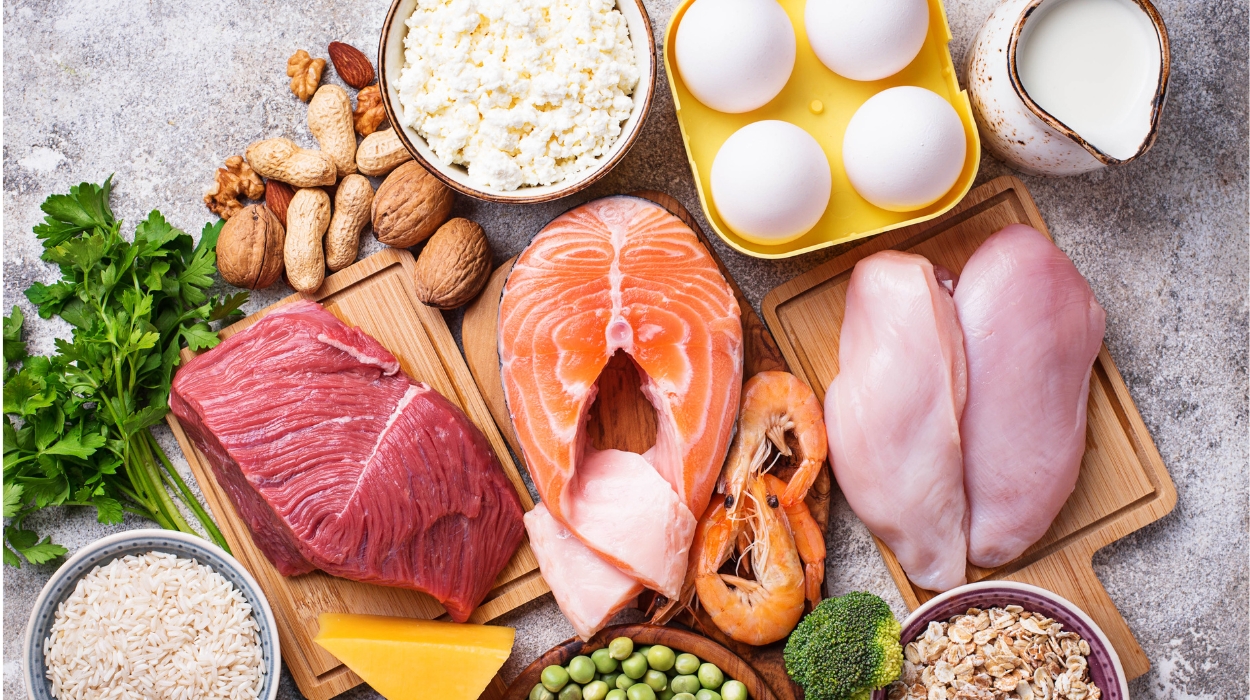If you want to lose weight, you may have heard that boosting your metabolism is one of the key factors. Your metabolism is how your body converts food and oxygen into energy and heat. The faster your metabolism is, the more calories your workouts burn, and you burn more calories at rest. This makes it easier to shed unwanted pounds.
But how can you increase your metabolism naturally and safely? In this article, we will share how to boost your metabolism and eat fewer calories to lose weight. These ten tips are natural and effective and will help you bolster your metabolism and muscle mass for a faster weight-loss journey.
How To Increase Metabolism To Lose Weight
- Eat lean protein.
- Do high-intensity interval training.
- Engage in strength training.
- Stand more.
- Drink more water.
- Drink green or oolong tea.
- Consume spicy foods.
- Get sufficient sleep.
- Drink coffee.
- Avoid crash diets.
10 Ways To Boost Metabolism To Lose Weight

These ten ways to boost your metabolic rate are based on scientific research. They are also easy to implement and help you achieve your weight loss goals faster and healthier.
However, it is important to keep in mind that everyone is different, and your body may not respond to some of these tips the way someone else might. Let’s take a look at each of them in detail.
Eat Lean Protein
Protein is one of the most important macronutrients for your metabolism, as it has a high thermic effect on food or TEF. This means your body uses more energy to digest, absorb, and process protein than other nutrients.
A consistent, adequate protein intake can increase your metabolism by 15% to 30%.[1] Actually, all food increases your metabolism somewhat, but carbohydrates only increase it by about 10% at most, and fat only about 3%. A diet with more protein means a higher metabolic rate throughout the day.
Eating more protein can also help you preserve your muscle mass, which is crucial for maintaining a high metabolism. Muscle tissue burns more calories than fat tissue, even at rest. Therefore, by eating enough protein, you can prevent muscle loss and keep your resting metabolic rate high.
Do High-Intensity Interval Training
High-intensity interval training, or HIIT, is a form of exercise that alternates between short bursts of intense activity and brief periods of rest or low-intensity activity. HIIT can be done with various types of exercises, such as running, cycling, swimming, or jumping rope.
HIIT can increase your oxygen consumption and calories burned during and after the exercise, a phenomenon known as excess post-exercise oxygen consumption or EPOC. This is also referred to as the afterburn effect.
This effect can help you build and maintain muscle mass, raising your resting metabolic rate or RMR.
Many studies[2] have shown a correlation between HIIT and a faster metabolism. It’s also been shown to improve exercise capacity, or the ability of your body to sustain longer duration exercises with improved lung capacity.
That means that not only does it speed up your metabolism, but it also helps you to exercise harder and longer so you can lose more weight.
Engage In Strength Training
Strength training is another exercise that can increase your metabolism and help you lose weight. Strength training exercises involve lifting weights or using resistance bands or machines to work your muscles against a force.
It’s recommended to do strength training and HIIT for health, muscle building, and weight loss.
Strength training builds muscle mass, which increases your resting metabolic rate. This means even when you’re not exercising, you burn more calories. Strength training can also counteract the drop in metabolism that often occurs during weight loss, as it prevents muscle loss and increases fat loss.
For older people who are looking for how to boost metabolism after 50, exercise might be more difficult, but it’s still important. While very high intensity and strong resistance may not be options for everyone as they get older, many effective options can still be done. These include walking, swimming, and hiking.
Stand More
Sitting for long periods can reduce your metabolism[3] and increase your risk of weight gain and chronic diseases. Sitting can lower your muscle activity and blood flow, impairing your ability to burn calories and regulate your blood sugar levels.
Standing up more often can help you burn more calories and improve your metabolic health. It can also lower your blood pressure, cholesterol, and triglyceride levels, benefiting your heart health.
You can stand up more by using a standing desk, taking breaks from sitting every 30 minutes, or walking around while talking on the phone.
Drink More Water
Water is essential for your metabolism, as it helps your body process calories and nutrients. Drinking water can also temporarily increase your metabolism[4] and help you feel full, which may cause you to eat fewer calories.
The reason is currently uncertain, but it may be that your body has to expend energy to bring cold water up to room temperature. Drinking water before meals[5] can also help you feel full, which can help you eat less and lose weight.
Drink Green Or Oolong Tea
Green tea and oolong tea contain antioxidants called catechins,[6] which may help increase your resting metabolic rate and body’s fat-burning potential. Catechins can enhance the activity of an enzyme that breaks down fat in your cells and helps regulate blood pressure.
Tea also contains a small amount of caffeine, which can enhance your energy expenditure. On top of all of that, tea is also great for a detox.
Clearly, tea is excellent for your health in various ways.
Consume Spicy Foods
Capsaicin, the compound that gives chili peppers their heat, has been long used in traditional medicine. Recent studies have shown thermogenic properties in capsaicin, where it helps to enhance fat-burning in the body.
These benefits are hard to measure directly, but most sources agree that the most probable reason capsaicin leads to weight loss is by increasing metabolic rate.
For example, a 2017 study showed capsaicin supplementation resulted in weight loss[7] and increased insulin response. A particularly high dose of capsaicin was also associated with reduced appetite. However, the high dose also resulted in digestive complaints in about a quarter of the participants.
Other spices, such as ginger, turmeric, black pepper, and cinnamon, may also have thermogenic effects and metabolic benefits.
Get Sufficient Sleep
Sleep is vital for your metabolism, as it affects the hormones that regulate your hunger, appetite, and energy expenditure. A lack of sleep[8] can lower your metabolic rate and increase your risk of obesity and diabetes.
Inadequate sleep disrupts the hormones[9] that control your hunger and satiety signals, and it can also impair your insulin sensitivity and glucose tolerance. This can affect your blood sugar levels and metabolism. To optimize your metabolism, you should aim for at least seven hours of quality sleep per night.
Drink Coffee
Coffee contains caffeine, which can boost your metabolism by stimulating your nervous system and increasing your heart and breathing rates. Coffee may also help you burn more fat and reduce your appetite.
For example, one study found that caffeine increased energy expenditure and reduced energy intake,[10] leading to weight loss and better metabolic balance.
Coffee may also have other health benefits, such as improving mood, memory, alertness, and physical performance. However, you should limit your intake to no more than four cups[11] per day and avoid adding too much sugar or cream to your coffee.
Avoid Crash Diets
Crash diets are very low-calorie diets that can drastically reduce your metabolism and cause muscle loss and weight gain in the long term. They can also trigger a starvation response in your body, which can cause a slower metabolism and make it harder to lose body weight in the long term.
Sometimes, these negative metabolic effects[12] can continue long after the crash diet is over.
Crash diets can have other negative effects on your health as well, such as a weakened immune system, increased stress levels, and nutrient deficiencies.
Instead of following a crash diet, consider adopting a balanced and sustainable weight loss diet that provides enough calories and nutrients for your body’s needs. Also include regular exercise and other lifestyle changes to boost your metabolism and lose weight healthily.
Foods That Speed Up Metabolism

Protein-Containing Foods
Protein-rich foods require more energy to digest, absorb, and process than other nutrients, which increases the calories your body burns. Protein-rich foods also help preserve muscle mass, which is more metabolically active than fat. Such foods include lean cuts of meat, the white meat of poultry, fish, eggs, and low-fat dairy.
Chili Peppers
Chili peppers and foods with capsaicin may also increase your metabolism and improve fat burning, as can caffeine in coffee or tea. Tea, green tea especially, is also rich in catechins, which can increase your metabolic rate as well.
Mineral-Rich Foods
You should also try foods rich in minerals like iodine and selenium. They’re needed for the proper functioning of your thyroid gland, which regulates your metabolism and produces hormones that affect your energy expenditure.
A deficiency in iodine or selenium may impair your thyroid function and lower your metabolic rate. Examples of mineral-rich foods are dairy, seafood, legumes, nuts, and seeds.
Weight loss supplements may help in difficult cases. Consult your doctor to see if a fat burner is right for you.
Tips To Maintain Weight Loss
Now that you know strategies for how to lose weight, how do you maintain it? Maintaining weight loss is not easy, but it is possible with some consistent habits and strategies.
- Exercise frequently.
- Eat breakfast regularly.
- Keep a food diary.
- Eat more fiber.
- Eat more lean protein.
- Drink less alcohol.
- Manage your stress.
- Get a good night’s sleep.
- Drink enough water.
- Eat whole foods and avoid processed food.
Conclusion
By now, you hopefully understand how to speed up your metabolic rate and increase energy expenditure while eating fewer calories. These tips for increasing metabolism are some of the best ways to lose weight naturally. A faster resting metabolic rate means that your food gets turned into energy faster.
Luckily, there are many natural and effective ways to increase your metabolism. A lot of them are just habits part of an overall healthy lifestyle, like getting enough regular exercise and restful sleep and focusing on certain healthy food groups.
Many techniques for maintaining your weight loss progress are also good for a healthy life, even once you’ve reached your weight loss goals.
By following these tips and strategies, you can improve your metabolic health and achieve your weight loss goals efficiently and healthily.
Frequently Asked Questions
Some drinks that may speed up your metabolism are green tea, oolong tea, and coffee. Anything caffeinated would boost your metabolism, but many other caffeinated drinks are high in sugar and other unhealthy ingredients.
Diets can impact metabolism both positively and negatively. High-protein and low-carbohydrate diets can increase your metabolism and preserve muscle mass. Crash diets, though, can trigger a starvation response that slows your metabolism.
It depends on the method you’re using. For example, capsaicin may boost your metabolism in the short term over a few hours. Regular exercise, however, will increase your metabolism more gradually but remain effective for longer.
Some foods you can eat before bed to burn fat are protein-rich foods, such as chicken, turkey, eggs, cheese, or nuts. Protein has an increased thermic effect on food and helps you preserve muscle mass.
 Evidence Based
Evidence Based
